Find the answer to the British ultimatum!
Of course, the British Foreign Ministry and the head of his Lord Curzon, sending a famous ultimatum to Moscow, did not in any way plan to bring their threats to life. However, in the same way as forcing the allies to pull chestnuts out of the fire for themselves, in the dialogue with the enemy, to bargain for the most comfortable and advantageous political and economic conditions for themselves was always in the Foreign Office rules.
And believe us, for every ultimatum
The air force will be able to give an answer!
These are lines from the last verse of the legendary Aviamarch, which says that "we were born to make a fairy tale come true." And let them today few people remember. And let only a few know about what kind of an “ultimatum” Pavel German wrote then, the author of the envy of the energetic text.
Meanwhile, in May 1923 of the year, Curzon's ultimatum was perceived by many in Soviet Russia as the announcement of a new, “fourth” campaign of the Entente. Although, fortunately, it did not come to yet another war with the whole of Europe, the diplomatic squabble was extremely acute - compared to it, the latest Anglo-Russian “clashes” may seem like just a child's game.
Note - from Baron, Marquis and Viceroy
The note of the British Government, compiled by Foreign Minister George Curzon, was presented to the Soviet Deputy Commissar for Foreign Affairs Maxim Litvinov by the English representative in Moscow, Sir Robert Hodgson 8 May 1923. The note contained completely unprecedented demands, even for those times.
So, according to British diplomacy, the activities of Soviet plenipotentiaries in Iran and Afghanistan allegedly violated the clause of the Anglo-Soviet trade agreement 1921 of the year, according to which Soviet Russia was obliged to refrain from anti-British propaganda in Asia. The British government demanded nothing less than the withdrawal of Soviet plenipotentiaries from their posts. Russia also had to apologize publicly for acts of anti-British propaganda.
The ultimatum of Curzon also demanded that the English spy Stan Harding, who was under arrest for espionage, be paid three thousand pounds sterling (about 30 thousand rubles in gold). Relatives of the English spy Davison, already shot, were asked to pay compensation in the amount of ten thousand pounds sterling (100 thousand rubles in gold).
The British government demanded the release of the English fishing trawlers "Saint Hubert" and "James Johnson", detained by the Soviet authorities for violating the 12-mile coastal water zone established by the decree of the Soviet government along the Murmansk coast. And besides, the payment of monetary compensation for the damage caused to these British fishermen, as well as the rejection of the 12-mile and the establishment of a three-mile zone of coastal waters.
Finally, Curzon’s ultimatum demanded that the Soviet government withdraw two notes from the Commissariat of Foreign Affairs, March 31 and April 4 1923, in which the USSR resisted British attempts to interfere in its internal affairs. This was done under the pretext of fighting the so-called religious persecution, after a Soviet court convicted Polish spy Xenz Budkevich.
The latter was shot for organizing an underground religious school in Petrograd, people from whom were actively anti-Soviet propaganda in Belarus. The note established a ten-day period to meet all these requirements, otherwise threatening to break the Anglo-Soviet trade agreement 1921.
In general, the conservatives, led by Andrew Bonar-Low, were not hiding, trying to prevent the further strengthening of the Soviet state.
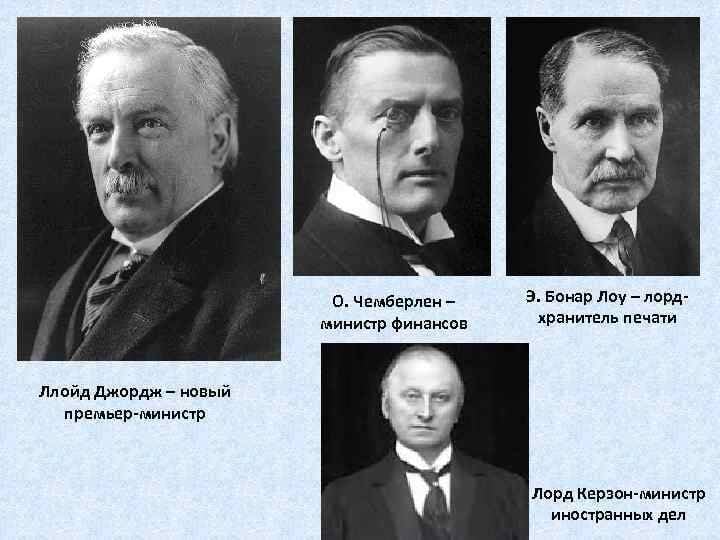
All attempts at financial and economic strangulation of the Soviet republic at the Genoa and Hague conferences failed, and Britain actually had the last resort - the traditional diplomatic moves. Isn't this sharpness of the Curzon note from here? However, even in England, many modern historians now regard the Curzon note as "an overt provocation, which the Soviets did not succumb to."
Is it any wonder that the Soviet press immediately called the British note an "ultimatum." But today, not even in all humanitarian universities, students are introduced to the once notorious Curzon ultimatum. However, the memory of another historical fact connected with the name of this British aristocrat, about the so-called Curzon Line, on which the Entente demanded to stop the Red Army's attack on Warsaw in 1920, was just as short.
Neither Trotsky, Chairman of the Revolutionary Military Council of the Republic, nor Tukhachevsky, Glavkozap, nor Stalin with Budyonny and Voroshilov, stopped on the Curzon Line, but after the “miracle on the Vistula” and the Western Front, and the First Horse had to roll away from it far to the east. By the way, if you do not take into account the fact that Lviv is now part of Ukraine, the modern border of Poland passes almost exactly along the “Curzon Line”.
Meanwhile, Lord Curzon himself and his actions always provoked the most vigorous reaction in Soviet Russia, and, above all, because England at that time was rightfully considered the first enemy of the Russian and world revolution. In this peculiar popularity, Curzon competed with Winston Churchill, many will surely recall the cognitive from Vysotsky - “Churchill thought it all up in 18.” The biography of the lord and marquis George Curzon was, of course, not as stormy as Churchill's, but he also managed to leave a bright trace in history regardless of relations with Red Russia.
The ideal of the aristocrat
George Nathaniel Curzon, more precisely, if you follow the English pronunciation, Curzon (Curzon), 11 was born on January 1859 of the year in Kedlston (Derbyshire). A graduate of Oxford, Curzon, in 1886, was easily elected to parliament on the list of conservatives and soon became deputy minister for Indian affairs. Already in the 1895 year, he first came to the British Foreign Ministry, again - the Deputy Minister.
When Curzon did not hold public office, he traveled around the Middle East, became an expert on Asian affairs and wrote several books. In 1898, Curzon, having received the title of Marquis of Kedlston, was appointed the vice-king of India and implemented reforms in the field of taxation, while at the same time pursuing a decisive line to preserve the Indian monuments of antiquity. As a result, it was his efforts that the famous Taj Mahal was meticulously restored.
Because of the conflict with his much more experienced commander in chief, Lord Kitchener, Curzon had to resign, leave India and be satisfied with his place in the House of Lords. In 1915, he entered the coalition cabinet of Henry Asquith. At a time when David Lloyd George became the Prime Minister of the Liberal Party, Lord Curzon, who was considered to be an extreme Tory, easily left Asquith and became one of the four ministers of the military office.
He was a classic English aristocrat - during the war, hitting a small beer factory in Flanders, where soldiers adapted huge copper vats under a bath, did not hide his surprise: "God, I had no idea that the lower classes had such white skin." Finally, in 1919, Curzon took the post of Minister of Foreign Affairs and remained in that post with the premiers Bonar Lou and Stanley Baldwin.
Lord Curzon had a completely sensible idea to draw the Russian-Polish border exactly along the ethnic section of the Polish, Slavic and Lithuanian lands - Grodno, Yalovka, Nemirov, Brest-Litovsk, Dorusk, Ustylug, east of Hrubieszhov, through Krylov and further west from Rava-Russkaya , east of Przemysl to the Carpathians. Perhaps the Bolsheviks were seriously mistaken by overestimating their forces and disagreeing on such borders with the new Poland of Pilsudski. After his ultimatum, Curzon relied, not without reason, for the post of prime minister, but King George V preferred the less extravagant Baldwin’s candidacy.
Curzon's ultimatum was presented to the Union of the USSR only four months after its creation. By the time Andrei Andreevich Gromyko wrote, “The Soviet country not only defended and weapons and at the negotiating table, their own right to independent development, but also provided substantial assistance to the peoples of the East in their struggle for independence. ” And the fact that the United Kingdom will very soon launch a diplomatic offensive has become clear at the very beginning of 1923.
The Bolsheviks, having won a difficult but unconditional victory in the Civil War, practically solved the main domestic political tasks and, with the creation of the Union of Independent Republics, which surprised the world with their unity and strength, were able to seriously take on the promotion to the East. And for London, which emerged victorious not from civil, but from world war, this meant the renewal of the old confrontation with Russia in Central Asia.
Echo of Lausanne
The exploration by force of the Foreign Office held even before the Red Republic united into the Union - first in The Hague and Genoa, then at the Peace Conference in Lausanne in the autumn of 1922 of the year. At the Genoa and Hague Conferences, the "Versailles winners" tried to impose truly unyielding conditions on Soviet Russia, but did not achieve either the abolition of the monopoly of foreign trade, the return of foreign property, or recognition of the debts of the tsarist and Provisional Governments.
In Lausanne, negotiations were to be held with Turkey, which had just reflected Greek aggression, and more generally, the settlement of Middle Eastern problems, including the issue of the Black Sea straits. Great Britain, which was rapidly losing its leading position in the world against the background of the increasing power of the United States, urgently needed to maintain and consolidate its shaken positions in the Middle East.
The conference was not so much “anti-Turkish” as it was frankly “anti-Soviet” in nature — the Entente openly feared the “Bolshevization” of Turkey, and did not invite representatives of Red Russia to Lausanne. But in the notes of 12 and 24 of September 1922, the Soviet government strongly opposed the non-Black Sea powers assumed the right to regulate the straits regime without the participation of Russia.
It would seem that the "great powers" could not pay attention to the protests of the Russians. But strangely enough, the threat of Moscow not recognizing any decisions on the straits worked - the delegation of the RSFSR was put out in Lausanne, refusing the same representatives of two other Black Sea countries - Ukraine and Georgia (the Soviet Union was created only three months later). You must admit that there is some irony of history that Georgian and Ukrainian diplomats were then simply “introduced” into the Russian delegation.
In Lausanne, the Soviet delegation put forward a program developed by V.I. Lenin:
1. Satisfaction of national aspirations of Turkey.
2. The closure of the straits for all warships in peacetime and wartime.
3. Complete freedom of merchant shipping.
Only three points - and complete clarity of relationships in the whole region. The reciprocal English project, outlined by Lord Curzon, provided for the right of free passage through the straits of warships of any country, both in peacetime and in wartime. England proposed the demilitarization of the coastal straits and the transfer of control over them to an international commission with the participation not only of the Black Sea powers, but also those that are far away from the Black Sea. This project, of course, was immediately supported by France and Italy.
The Soviet delegation opposed Curzon's plan, describing it as an obstacle to peace in the Middle East and offering complete freedom of passage through the straits for merchant ships and for commercial aviation any power. But for warships and military aircraft of all states except Turkey, the straits were proposed to be closed.
But Turkey, contrary to the agreements, agreed to the English draft of the Convention on the Straits. The Turks began separate negotiations on the basis of the Curzon conditions, counting on concessions to England on other issues. This predetermined the results of the work of the commission on the straits. Lord Curzon declared that the Soviet project was unacceptable, proposing to transfer the coordination of his project to an expert committee. At the same time access to the Soviet representative was closed there.
After this, the aggravation of Soviet-British relations was almost inevitable. At a conference in Lausanne, a break was announced, and the Soviets, as the British conservative newspapers wrote, "after a series of notes and protests, moved from words to deeds."
In memory of comrade Vorovskogo
It must be remembered that during the premiership of Andrew Bonar-Low, who frankly admitted that he did not understand diplomacy, Lord Curzon was absolutely the absolute leader of British foreign policy. Nothing restricted him from pursuing a course openly hostile to the Soviet Union, and Curzon was ready to return to the methods and objectives of the period of anti-Soviet intervention.
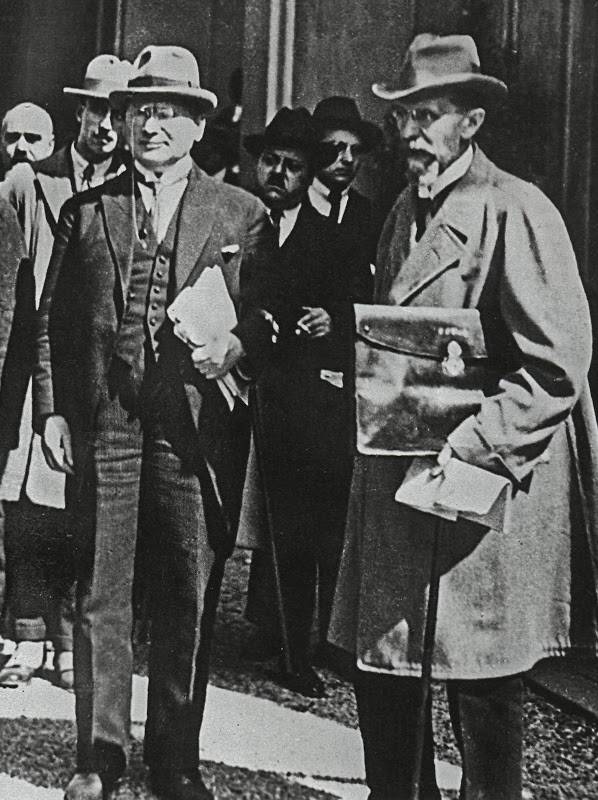
Vaclav Vorovsky and Maxim Litvinov shortly before Lausanne
During the days of the ultimatum Curzon, the world press was full of reports about the sending of British military missions to Poland and Romania, that the English fleet had once again moved, as in 1878 and 1915, to the Dardanelles. Naturally, Wrangel's White Guards who had settled in Gallipoli immediately revived.
In addition, the British squadron, which now did not have to look back at the German “Fleet of the open sea” submerged in Scapa Flow, planned to move to the shores of the Baltic states. Owners of shares of canceled Russian loans and nationalized enterprises launched a loud propaganda in the newspapers. English millionaire Leslie Urquart, in a letter to the Times, stated: "Curzon's ultimatum is the first indicator of firmness and intelligence in relations with Russia."
In terms of time, Curzon’s ultimatum almost coincided with the murder of Soviet diplomat Vaclav Vorovsky. The note was given to Maxim Litvinov on 8 in May, and on 10 in the same quiet Swiss Lausanne, the White Guard Moritz Conradi shot Vorovsky right in the hall of the hotel restaurant. By that time, the conference interrupted in the fall resumed work, but without the participation of a Soviet delegation.
According to diplomatic traditions, the Soviet plenipotentiary in Italy, Vorovskogo, who was left almost alone, could not be completely removed from the conference, but he was shamelessly harassed, and Soviet diplomats only had to dream of effective personal protection.
Three months later, already in Rome, in completely different conditions, what the powers basically agreed to in Lausanne will be signed ... But not by everyone - the Soviet Union will not ratify the Lausanne Convention as violating its legal rights and not guaranteeing peace and the security of the Black Sea countries.
The English opposition press said: "The Soviets could afford to" spit on Lausanne, "because in the confrontation with Curzon they almost completely defended their point of view on major issues, losing in matters of secondary importance." So, the trawlers promptly returned them to the British. The USSR paid for financial compensation for the spy of Sten Harding and the family of Davison, although with the proviso that "the Soviet government does not at all refuse to recognize the correctness of its actions with respect to the persons mentioned."
Proletarian Benefit
And the first May response to Lord Curzon’s ultimatum was a many-thousand-day working demonstration in Moscow. Of course, it didn’t go without a “guiding and directing” case, although the then CPSU (B.) Is not at all the CPSU of the 70-80-s sample. And yet, hundreds of thousands of Muscovites on the Tver and Okhotny series can not be gathered under duress.
Photographs are a special document, they do not know how to lie as politicians and historians do. And it’s easier to shoot a real writer or a poet than to make him lie - with Esenin or Mayakovsky this is definitely not the case. And if someone, like Bulgakov, had to publish abroad, there was no need to lie even under duress. Not surprisingly, the nerve of the era is so keenly felt in the poetic lines of the great Russian poets and in the short newspaper report "Benefit of Lord Curzon", written by Mikhail Bulgakov for the Berlin émigré newspaper Nakanune.
If you look at the newspapers of those years, and not only the Soviet ones, if you look into the memoirs of contemporaries, you get the impression that it was not Curzon’s ultimatum by itself, but a demonstration in Moscow that became the source of inspiration that didn’t keep silence to Yesenin, Mayakovsky and Bulgakov. Well, to edit the classics is an ungrateful thing, therefore, citing their bright lines, we confine ourselves to only minimal comments.
“Beware, Curzon - ASPAS is armed,” Sergey Yesenin unobtrusively warned, meaning who would you think?
ASPS is the Azerbaijani Council of Trade Unions. The interest of the British to the Baku oil was no secret for anyone then, and the poet, the opponent to the English lord, picked up the most worthy one. However, this line was enough for the irrepressible Mayakovsky in order to beat Yesenin's “competitor” in a propaganda rush:
Curzon, many
heard the ringing
don't know
What is Curzon ...
It was in this way, one great poet, not alien to politics, who turned to another, who had fled from politics, in his “Mayakovsky galleries”, so convulsively and self-confidently.
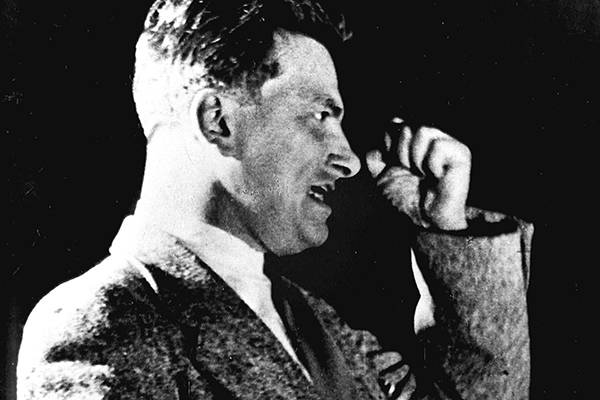
However, the loud Vladimir Vladimirovich had other lines with Lord Curzon:
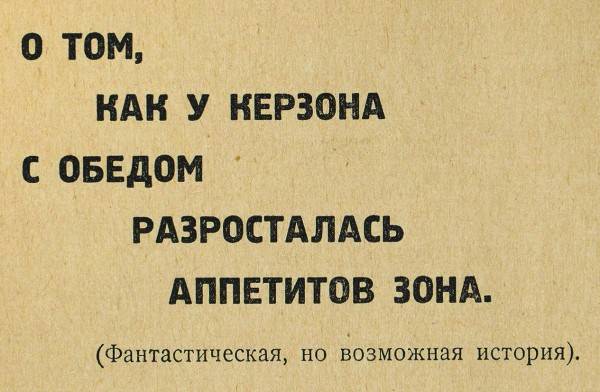
U Curzon
stunning view.
Curzon is rich,
Curzon gives birth.
...
Face
accepts,
which is fashionable.
Which one
English merchants anything.
And this, you see, is already a real Mayakovsky. And Lord Curzon is also here, isn't it, such a “real” one!
Well, the "real" Mikhail Bulgakov, in turn, could not help noticing at that demonstration Mayakovsky himself: "... Mayakovsky, having opened his monstrous square mouth, was thumping over the crowd with cracked bass ..."; "Mayakovsky threw away all heavy, like cobblestones, words ..."
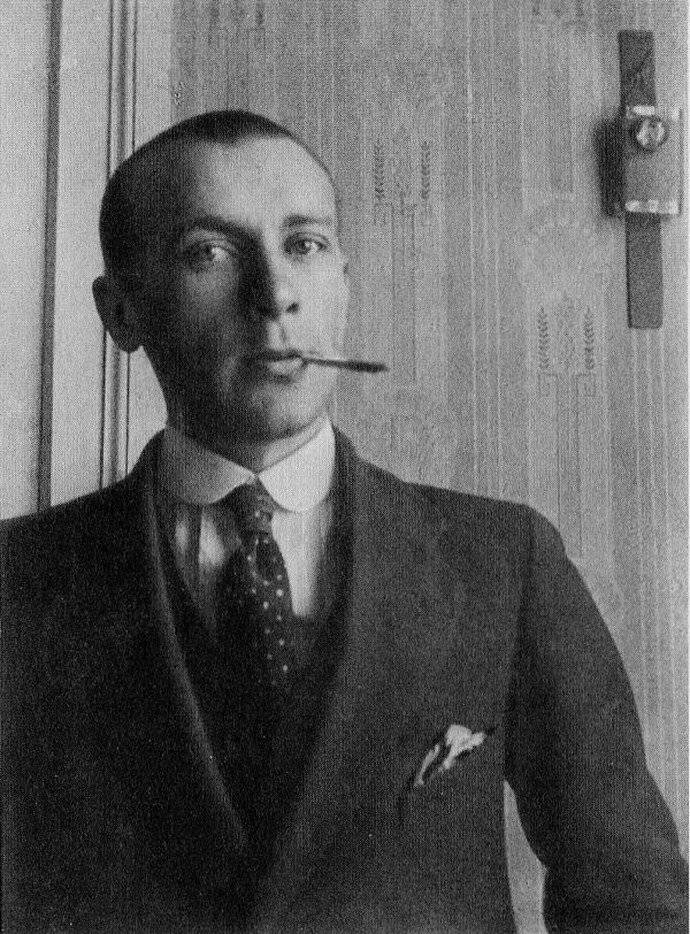
Not everyone will recognize in this young lover the future author of "The Master and Margarita"
Bulgakov's report itself is dynamic like an urgent telegram:
To protest, comrades !! Here are the events! Met Moscow. It seemed that there was some kind of electricity in the air!
And further:
From the balconies, from the window sills looked hundreds of heads. I wanted to go to the alley, so that in a roundabout way I could go to the Passion Square, but in Mamontovsky the Lomoviki, two cars and cab drivers got hopelessly stuck. I decided to go with the flow. A chariot truck floated above the crowd. Lord Curzon, in a top hat, with a painted crimson face, in a crumpled dress coat, was standing still ...
... Komsomol members sang in chorus:
Write, Curzon, but know the answer:
Paper can endure, but we do not!
... In the Council, the windows were open, the balcony was filled with people. Pipes in the stream played the “Internationale”, Curzon, rocking, rode over their heads. From the balcony shouted in English and in Russian:
- Down with Curzon !!
Many thousands of demonstrations after Moscow and Petrograd swept across the country - the Bolsheviks have not felt such popular support for a long time. Moreover, in May 1923, the whole world was again able to see what real proletarian solidarity is. Mass demonstrations in all countries, including England, under the slogan “Hands off Soviet Russia”, forced the governments of other countries to refrain from supporting the adventure of Curzon.
In England itself, the opposition of His Majesty, the Liberals and Labor, came out against the Minister Lord Curzon and demanded a peaceful settlement of the conflict. The Foreign Minister was actually forced to change the terms of the ultimatum twice and in the end agree to a compromise agreement with Soviet Russia. Already in June, 1923, the parties stated that they consider the conflict settled.
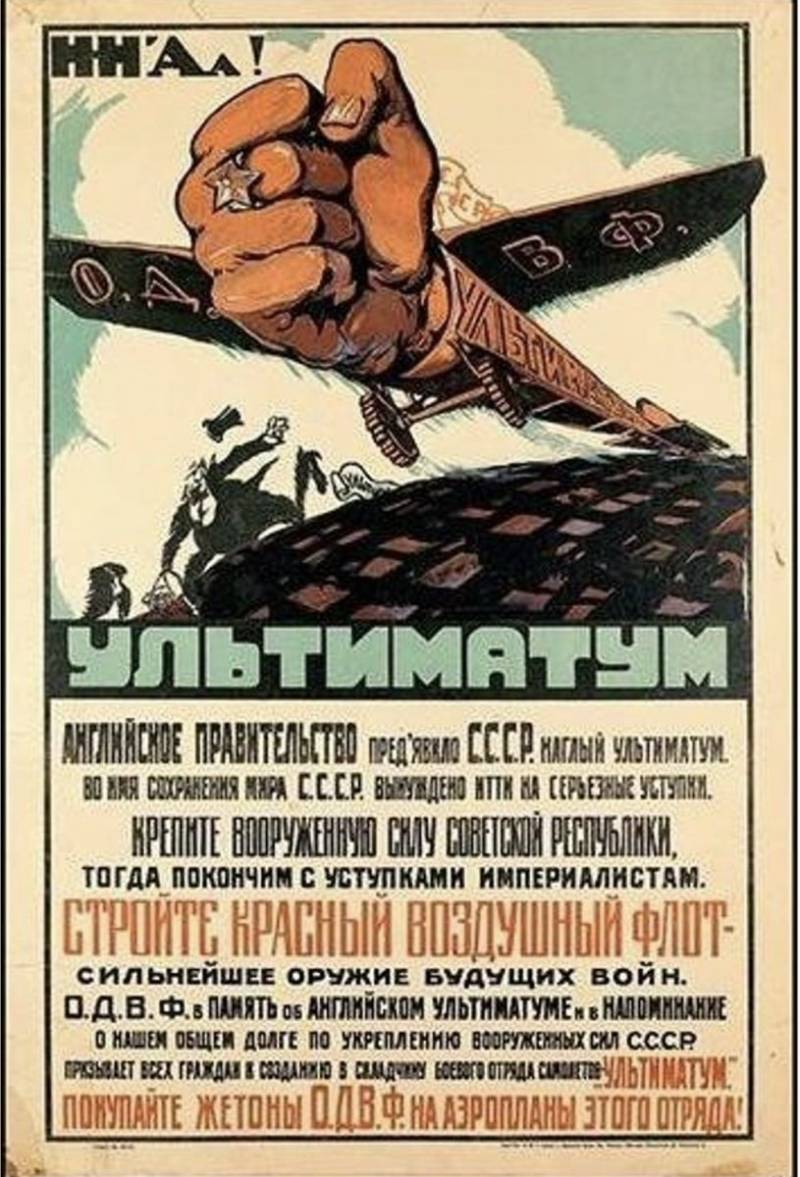
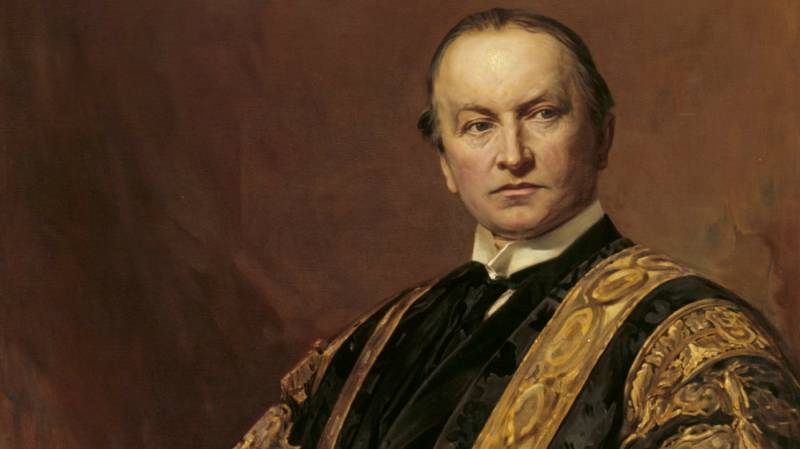
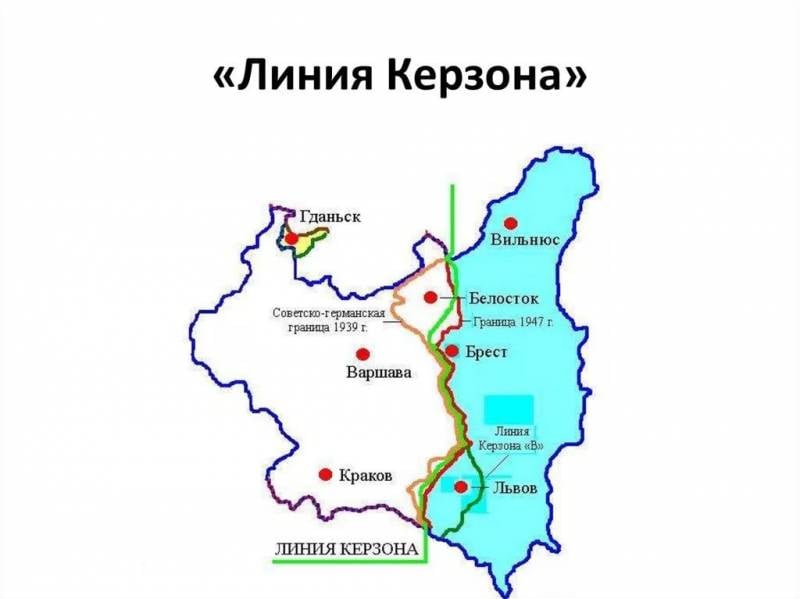
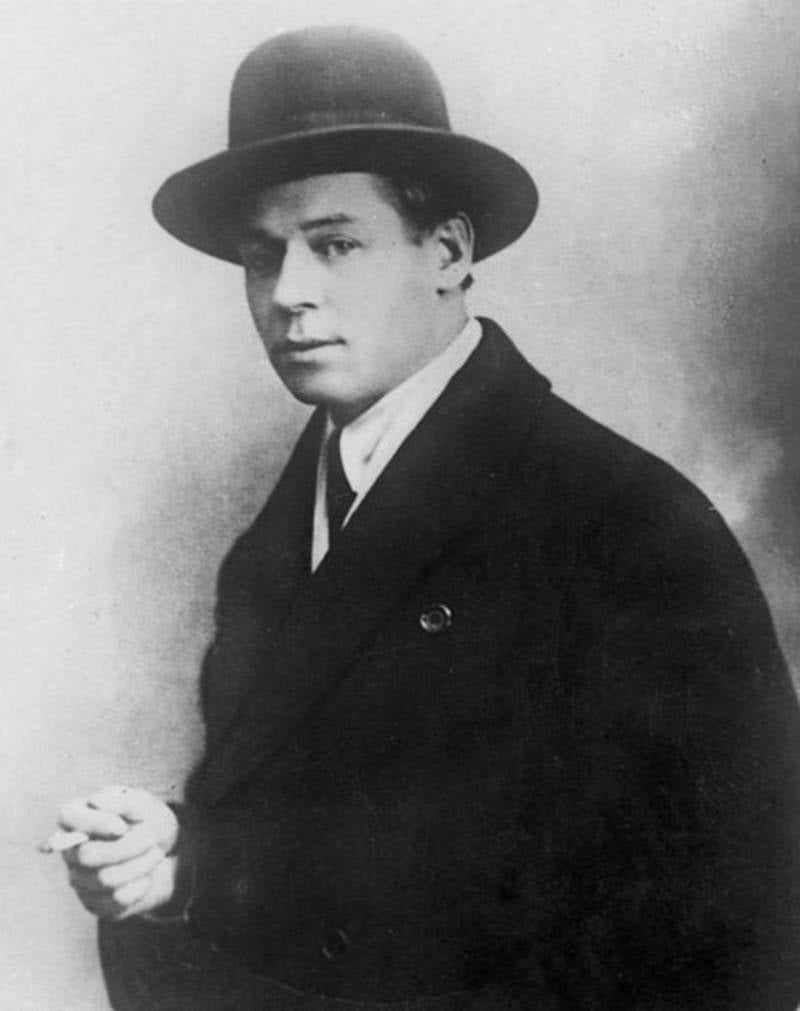
Information